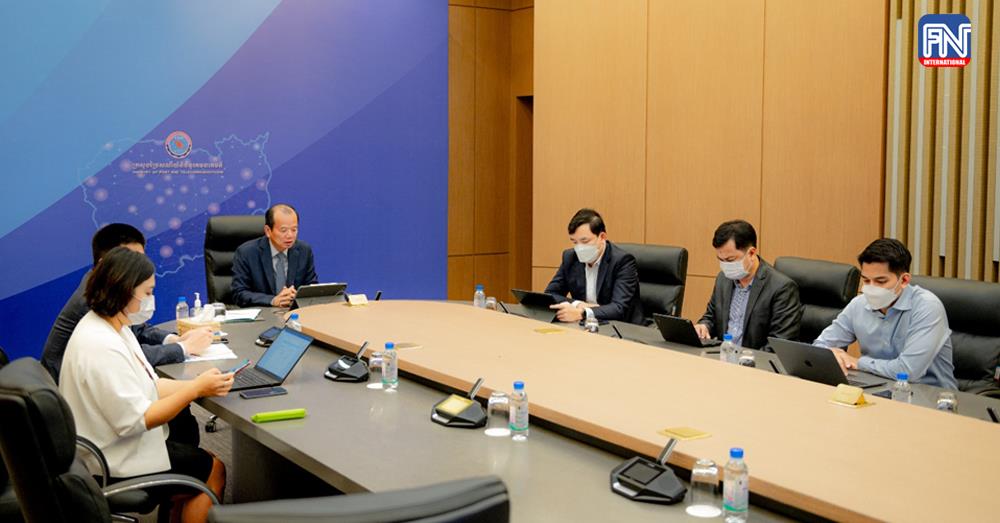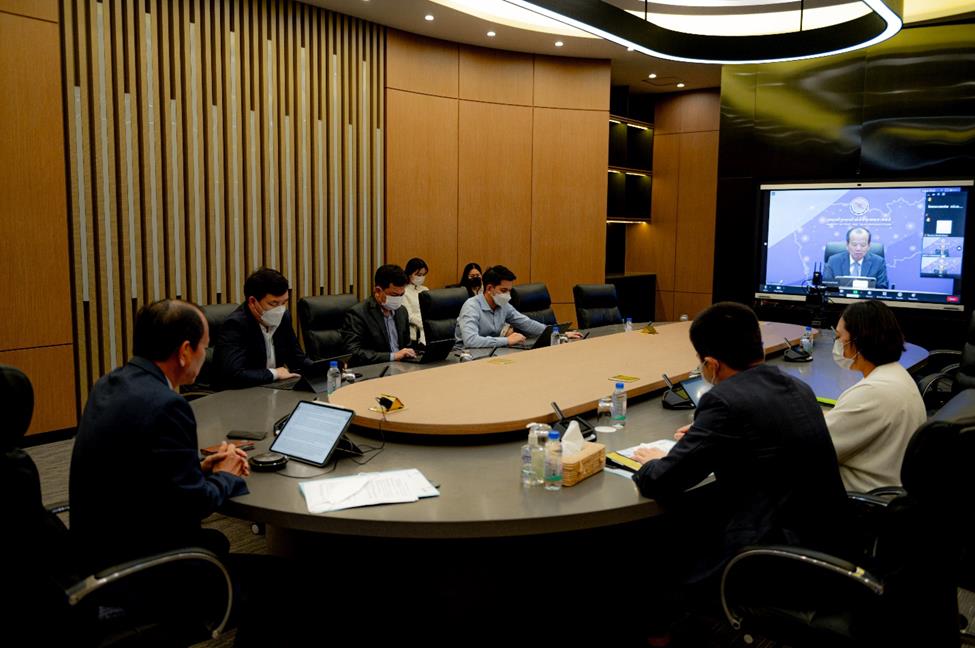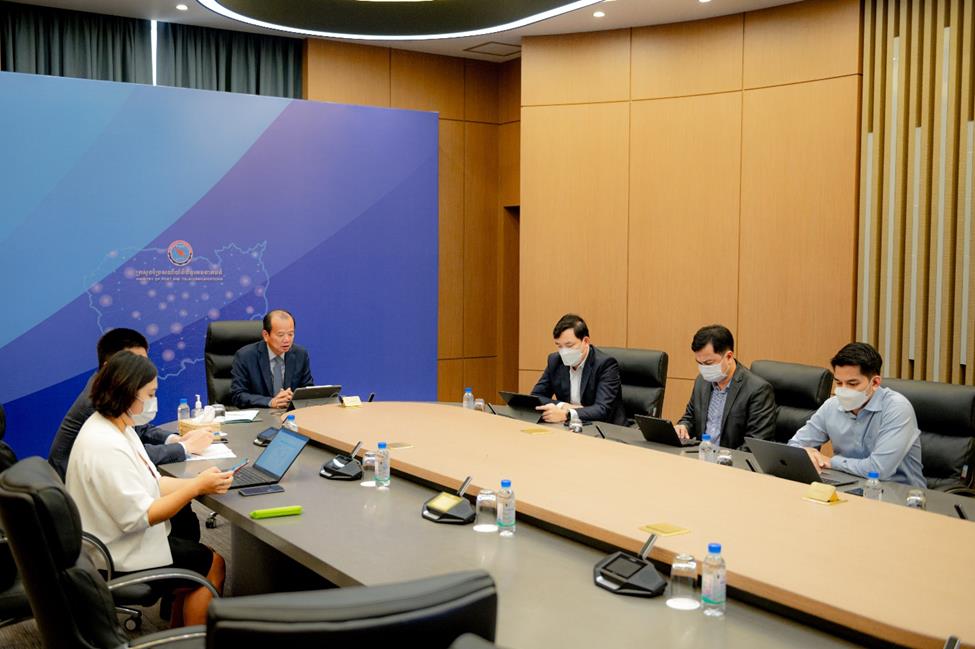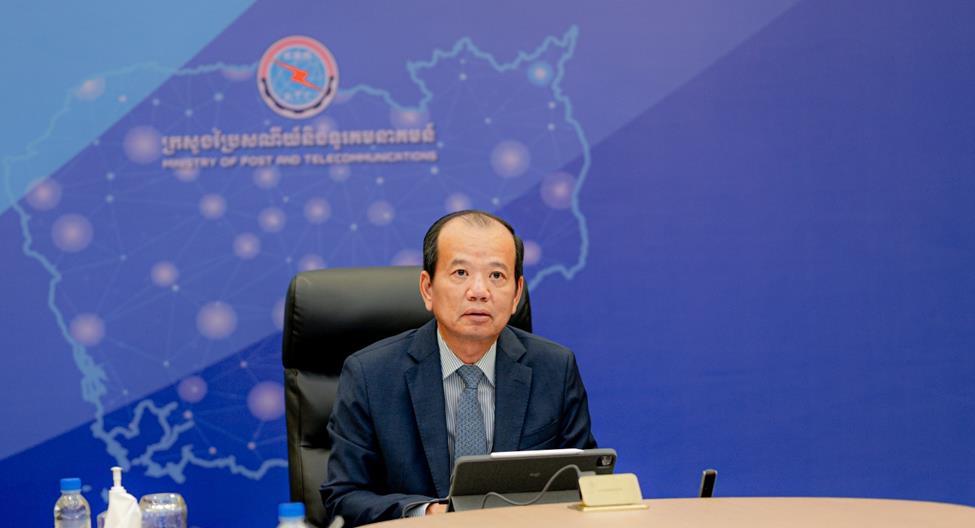Phnom Penh (FN), Nov. 30 – Minister Chea Vandeth of the Cambodia’s Ministry of Post and Telecommunications (MPTC) was among the distinguished leaders from several countries who took part Huawei’s 2022 Sustainability Forum, Connectivity+: Innovate for Impact (CSD).
The event was held on 23 November. Minister Vandeth spoke to the other participants virtually from his office in Phnom Penh.
He was joined there by Huawei Cambodia CEO Yao Yuya and other top officials of Huawei Cambodia and MPTC.
The other speakers include Liang Hua, chairman of the Board of Huawei; Malcolm Johnson, deputy secretary general of International Telecommunications Union (ITU); Siddharth Chatterjee, United Nations (UN) resident coordinator in China; Cao Ming, president of Wireless Solution of Huawei; Afke Schaart, Huawei senior vice president of Global Government Affairs; Mustafa Jabbar, minister of posts and telecommunications division of Bangladesh; Mohsin Mushtaq Chandna, federal secretary for the Ministry of IT & Telecommunication of Pakistan; Umar Garba Danbatta, EVC/CEO of Communication Commission of Nigeria; Luis Neves, CEO of Global Enabling Sustainability Initiative; Kitty Fok, managing director of IDC China; Yin Haitao, professor of Business Economics and public policy vice dean, Antai College of Economics and Management at Shanghai Jiao Tong University; Thami Sibanda, principal of Tlama Tlama Primary School in South Africa; Omer Sahin Ganiyusufoglu, academician at German National Academy of Science and Engineering (GASE).
In his presentation, minister Vandeth noted the need for internet access and the importance of collaboration between the public and private sectors to address digital divide and related issues.
“As the previous discussion has touched on, I believe that internet access has become a necessity for everyone, not just for those that can afford it,” he pointed out. “Both the public and private sectors have come together to address the digital divide and the still-unconnected, prompting us to come up with cost-effective measures to tackle these issues in a timely and in an inclusive manner.”
The MPTC official then talked about how digital technology has transformed Cambodian government service for the better. He subsequently discussed Cambodia’s journey towards meaningful human connectivity and sustainable digital transformation for its people.
“Last year, the government of Cambodia adopted the Cambodia Digital Economy and Society Policy Framework 2021-2035, aiming with a long-term vision to build a vibrant digital economy and society,” Vandeth noted.
“This year, the Digital Government Policy 2022-2035 has also been adopted, and our priorities involve building a digital nation by strengthening cyber-security and data centres, e-documents and IDs and online collaboration platforms,” he added.
Minister Vandeth said Cambodia’s Digital Development Policy is in the final stages and will be ready for adoption by early next year.
“Improving rural connectivity is one of the top priorities of the Digital Government Policy,” he stressed.
He also disclosed plans to build community tech centres in all high schools across the country.
“With these policies and action plans, I believe that the digital divide will be greatly reduced,” he said. “And we can achieve our objective of building a digital society as planned.”
Chatterjee of the UN earlier called for close collaboration among various stakeholders to address the digital divide. He said multi-stakeholder partnerships of policymakers, the private sector, academia, and civil society are needed to close "the sobering reality" of a digital divide which excluded a third of the global population.
"Our dynamic world urgently needs improved digital cooperation to capitalise on the transformational potential of technology to create new jobs, boost financial inclusion, close the gender gap, spur a green recovery and redesign our world to be more prosperous and inclusive," he said. "Now is the time to act".
In a second presentation, Vandeth talked about the impact of the COVID19 pandemic and other challenges they faced as they tried to expand connectivity in Cambodia, especially in the rural areas.
“COVID19 taught us about the importance of connectivity, particularly during the lockdowns and travel restrictions,” he pointed out. “This pandemic has exposed some of society’s weaknesses, notwithstanding its negative impacts.”
“The other prominent challenges include a big rural divide, a lack of digital literacy and limited connectivity,” he added.
In response to these unprecedented times and challenges, according to him, the Cambodian government, like many other governments, has adopted several key national policies and strategies to promote connectivity and quality of service.
During the same event, Huawei agreed to become a part of the ITUs Partner2Connect digital alliance, an initiative slated to bring connectivity to about 120 million people in remote areas in more than 80 countries by 2025.
The Huawei pledge was delivered by Chairman Liang, according to a media release from Huawei.
Liang stressed that access to a stable network was a basic requirement and right in the digital age. For many who remain unconnected, according to him, access to reliable connectivity would mark the first step towards transforming their lives.
"Connectivity will be more than just a tool for convenient communications," he said. "Together with digital technologies like cloud and AI, connectivity will help bring everyone into the digital world, and provide them with access to more information and skills, better services, and wider business opportunities. This will, in turn, drive further social and economic development."
Cambodia will be among the first countries that will benefit from the partnership between Huawei and ITU.
The same media release from the global tech giant announced that Cambodia is ITU’s first P2C partner country.
“Huawei will work with government departments through the Ministry of Posts and Telecommunications and universities to provide 10,000 training opportunities for ICT professionals in the next five years,” it said.
Huawei announced earlier that by 2025, with the improved ICT infrastructure, the company will work with partners to enable 500 million people to enjoy digital financial services and 500,000 people to enjoy inclusive education.
Cao of Huawei Wireless Solution said they are well-positioned to work with ITU and expand connectivity to rural areas in many countries.
"As an enterprise with the most complete ICT capabilities, Huawei integrates the full-technology innovation potential of equipment, sites, energy, transmission, and antennas to address the difficulties faced by traditional site deployment, such as high costs, restricted transportation, lack of power, and maintenance challenges,” he said.
According to him, Huawei is continuously upgrading the RuralStar and RuralLink solutions to extend quality coverage to remote areas, enabling more people, community hospitals, schools, local governments, and small- and medium-sized enterprises to enjoy the same high-speed broadband connectivity experiences as those in cities.
Johnson of ITU said they are happy to work with Huawei.
"It is clear connectivity alone is not enough. It must be affordable, the content must be relevant and in the local language, and users must have the skills to make best use of it,” he said. “Thank you to Huawei for their support of the Partner2Connect (P2C) Digital Coalition and for their announced P2C pledges in the key areas of rural connectivity and digital skills”.
=FRESH NEWS



